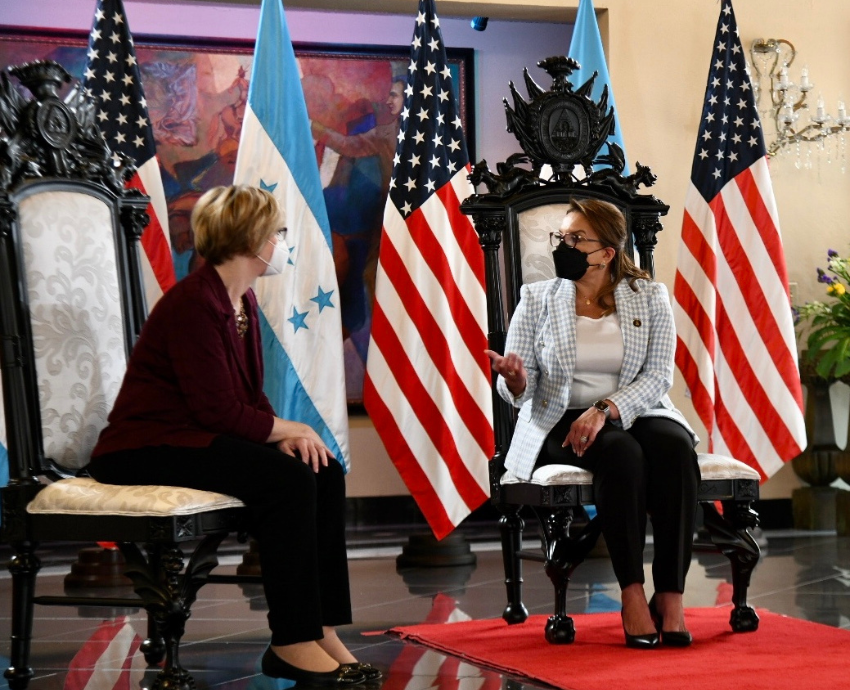
United States Ambassador to Honduras Laura Dogu was summoned by Honduran foreign minister Enrique Reina on October 31 for meddling in the country’s internal affairs.
Dogu’s comments during her speech at the American-Honduran Chamber of Commerce (AmCham) annual meeting on October 25 sparked widespread denouncements. Dogu warned the group of businesspeople that “some policies [adopted by the Honduran government] are complicating your chances of success”.
Since her appointment in April, Dogu has been openly critical of the Xiomara Castro government. Castro took office in January after running on a progressive platform where she gained the highest vote for a presidential candidate in the country’s history and became the country’s first woman president.
Castro’s campaign platform proposed higher taxes on wealth, increases to welfare and incomes, a withdrawal of mining concessions and changes to Honduras’ restrictive abortion laws.
Dogu criticised the “messages from the government about the need to reduce or eliminate investment incentives”.
“Without a doubt, all these actions are sending a clear message to companies that they should invest elsewhere, not in Honduras.”
Dogu’s mention of “investment incentives” was a thinly-veiled reference to the country’s Economic Development and Employment Zones (ZEDEs). These zones — introduced by the previous National Party of Honduras (PNH) government in 2012 and consolidated by right-wing former President Juan Orlando Hernández — were established to attract foreign investment. Inspired by the neoliberal, neocolonial concept of “charter cities”, ZEDEs are autonomous territories handed over to transnational companies to exploit for profit.
Within ZEDEs, private companies can establish their own judiciary, police and education systems, outside of government control. Largely due to the displacement of Indigenous communities and farmers, these zones are sites of widespread human rights abuse and environmental destruction.
Eliminating the charter cities was one of Castro’s campaign promises, and she signed a decree in April that repealed the original law that formed the ZEDEs. The decision was welcomed by environmental and indigenous rights activists, but predictably met with outcry from transnational companies and US politicians serving their interests.
A US state department report, released in July, criticised the ZEDEs repeal law, as well as the Castro government’s new energy policy and labour laws, arguing that they “dramatically increased the uncertainty of investment returns”. In other words, they threaten the huge profits of investors and private companies. Despite admitting that the ZEDEs were “broadly unpopular”, the report admonished the Honduran government for not “seeking dialogue with the ZEDE investors”.
The US embassy’s deputy chief of mission Roy Perrin met with representatives from Próspera — one of Honduras’ largest ZEDEs opposed by indigenous Garífuna communities — on September 30 to “discuss the investment climate in Honduras”. Despite the ZEDEs repeal law, Próspera have pushed ahead with plans to displace local communities.
US senators Bill Hagerty and Ben Cardin urged the state department in an October 13 letter to act against the Honduran government, in response to the ZEDEs being scrapped. Hagerty and Cardin said that repealing the ZEDEs will “dramatically undermine the strong US interest in encouraging significant new private sector investment in Honduras and the region”. They proposed changing free trade laws to “address any threats of expropriation or actions of the Honduran government relative to US investments”.
Dogu reaffirmed this when she said that “the United States Congress is concerned about the treatment of foreign investment in Honduras”.
“Our promise is also to support the Castro administration’s fight against corruption,” Dogu continued. “Because corruption in the government, private sector and individuals is killing Honduras.”
Dogu’s comments underscore that US foreign policymakers only care about the “fight against corruption” in situations that suit their imperialist ambitions. The US government was happy to overlook over a decade of widespread corruption, human rights abuses and rising poverty in Honduras under the PNH regime.
After the military coup overthrew democratically elected President Manuel Zelaya in 2009, the US provided diplomatic and financial support — including millions in military aid — to prop up the PNH regime.
Dogu’s comments at AmCham were not an outlier. She attacked the Castro government’s new energy laws — which aimed to reduce electricity prices across the country — on May 4, saying she was “worried about the effect it will have on foreign investment”.
Dogu previously served as the US ambassador to Nicaragua between 2015–18, using her position to attack and undermine the Daniel Ortega government. She is now acting as one of the many arms of US imperialist foreign policy in Honduras, to protect the interests of US companies.